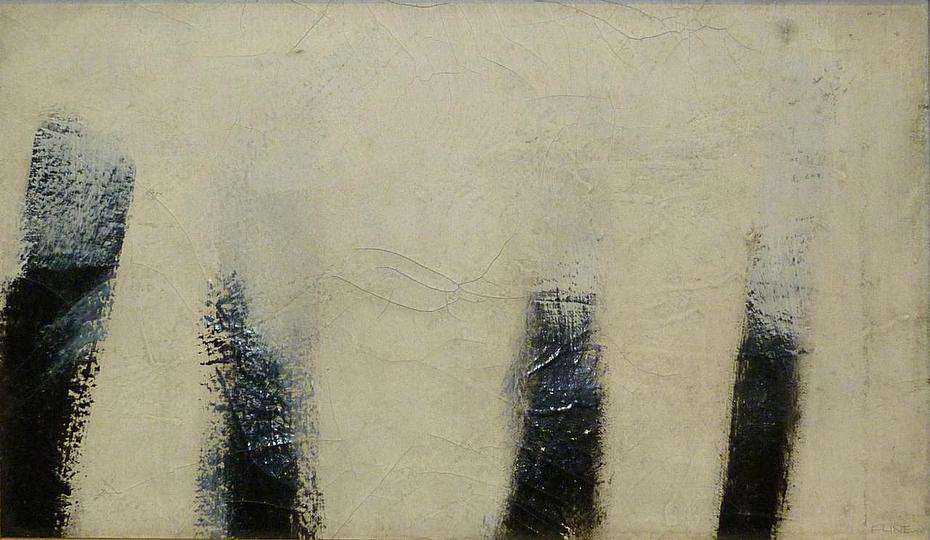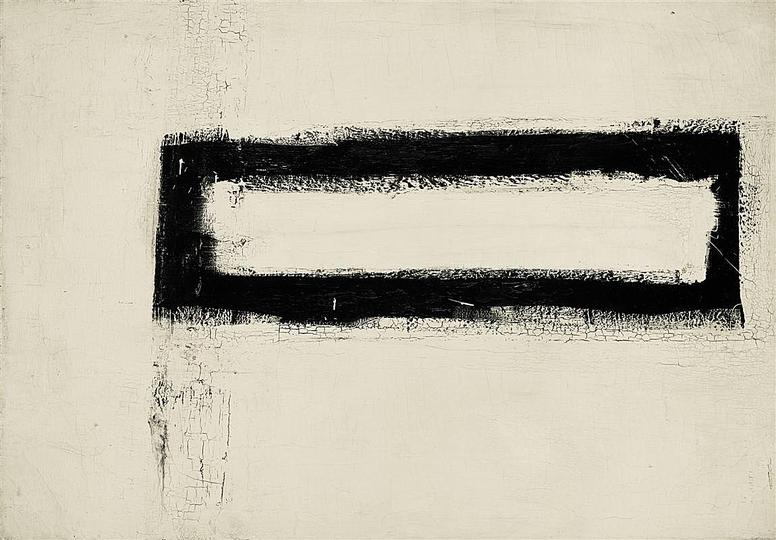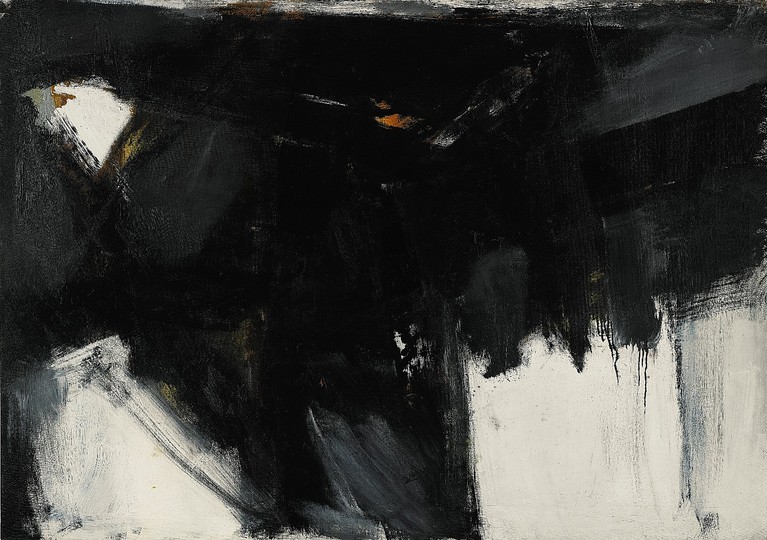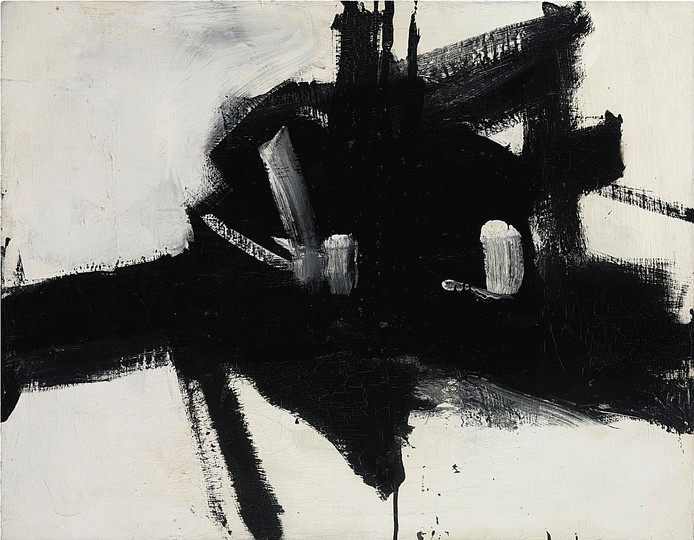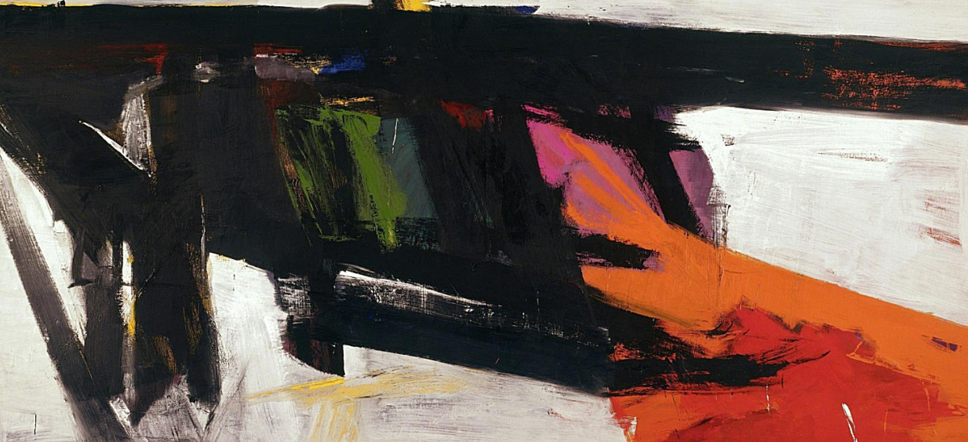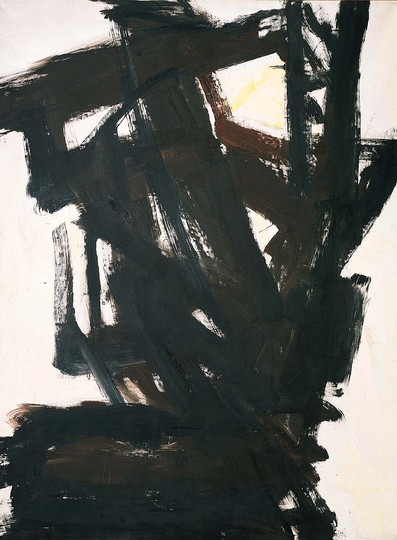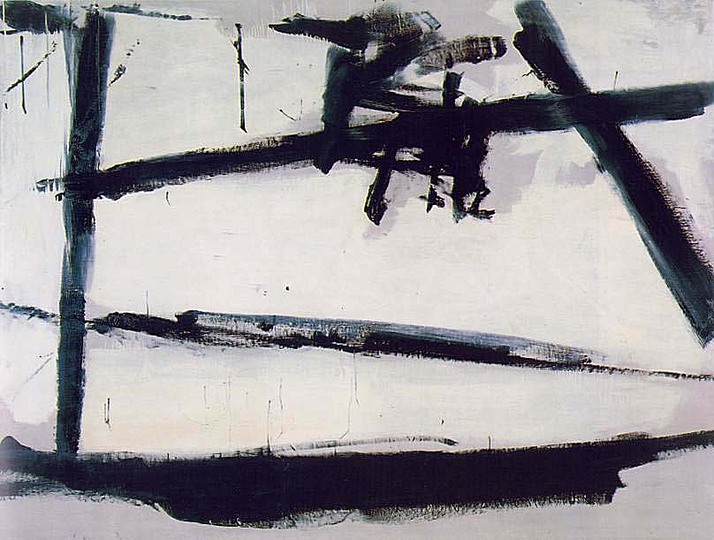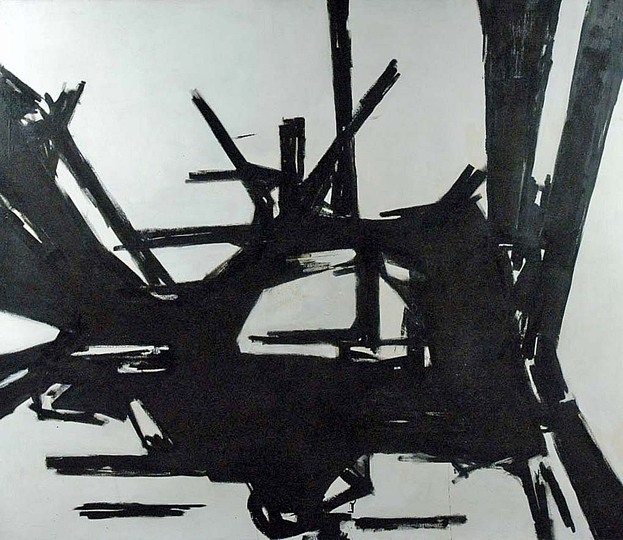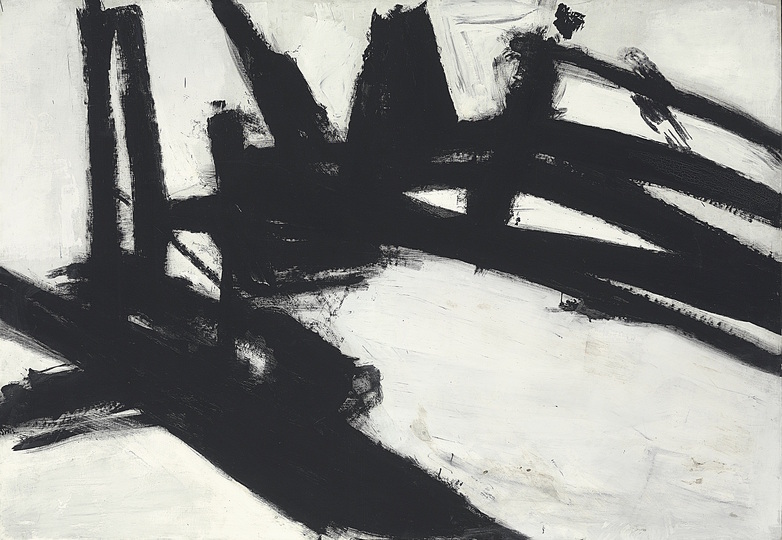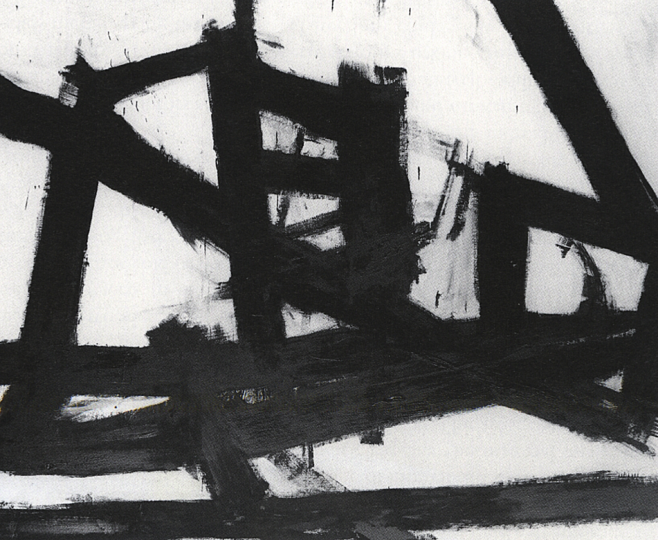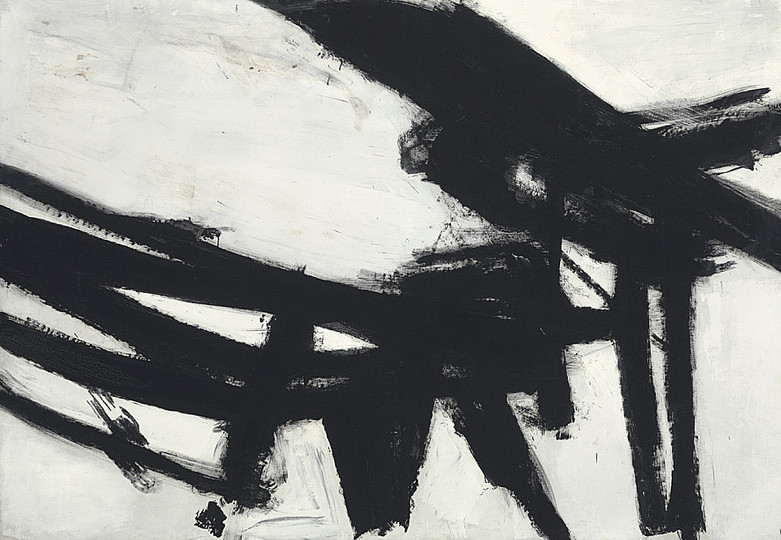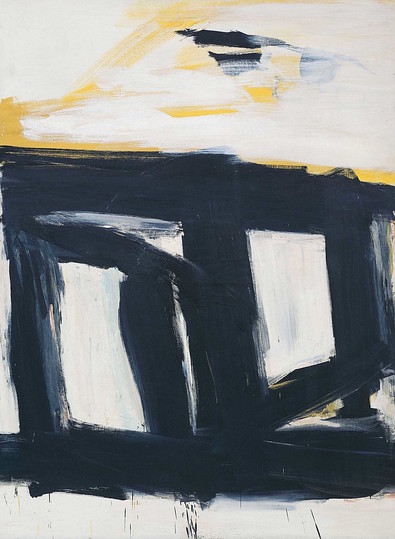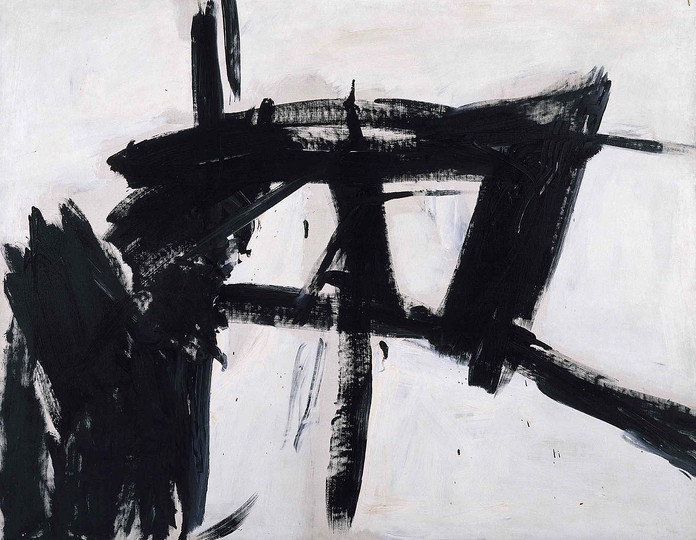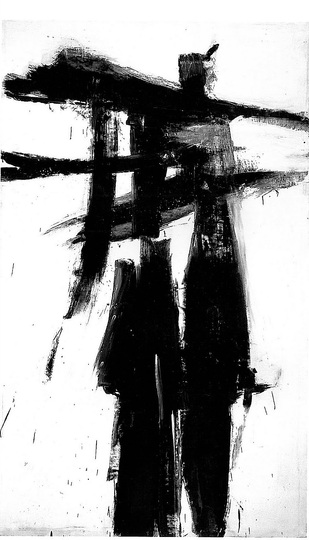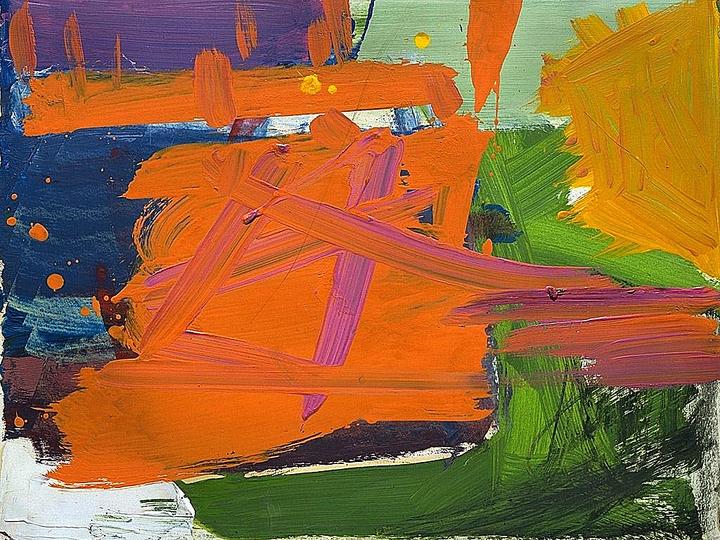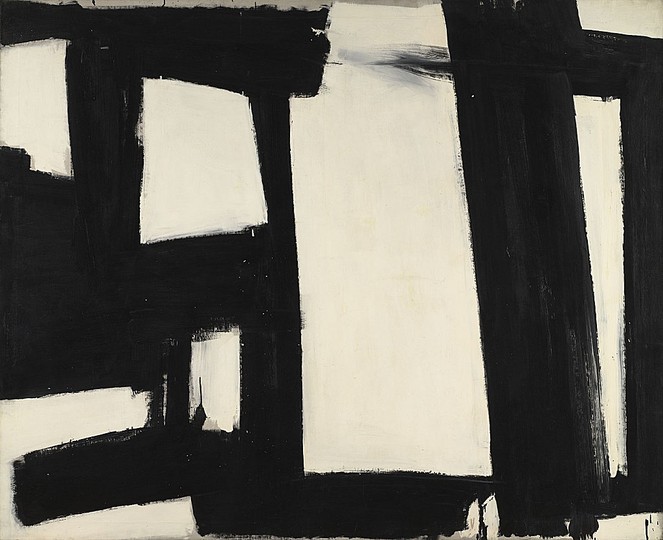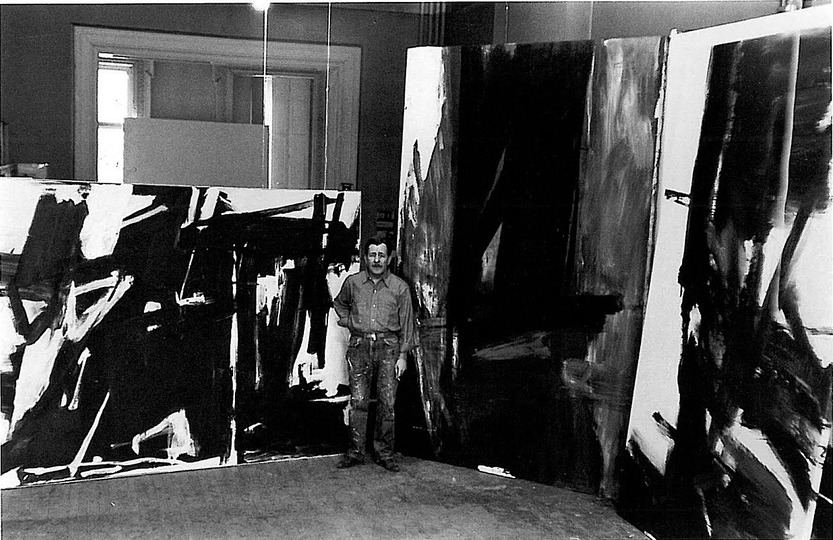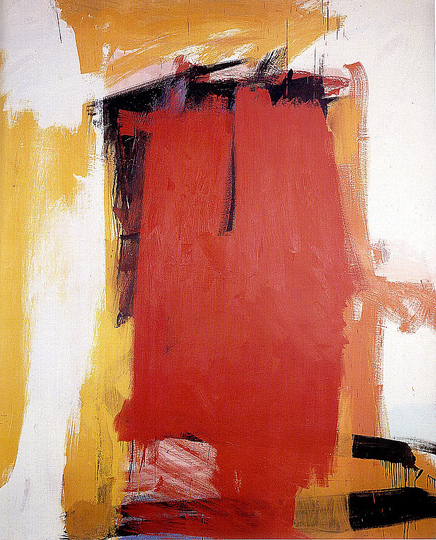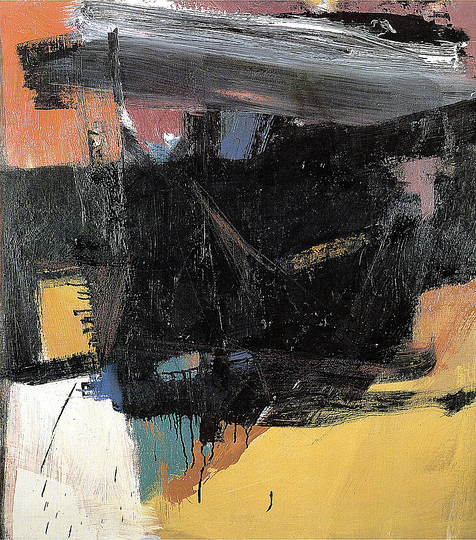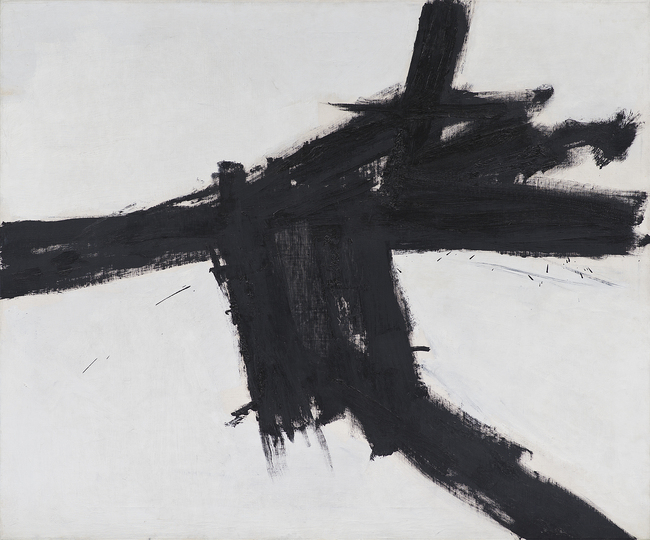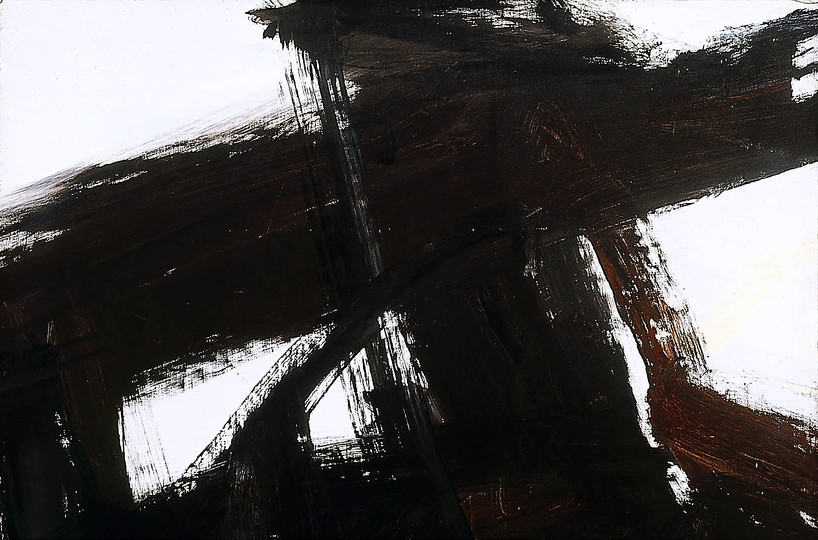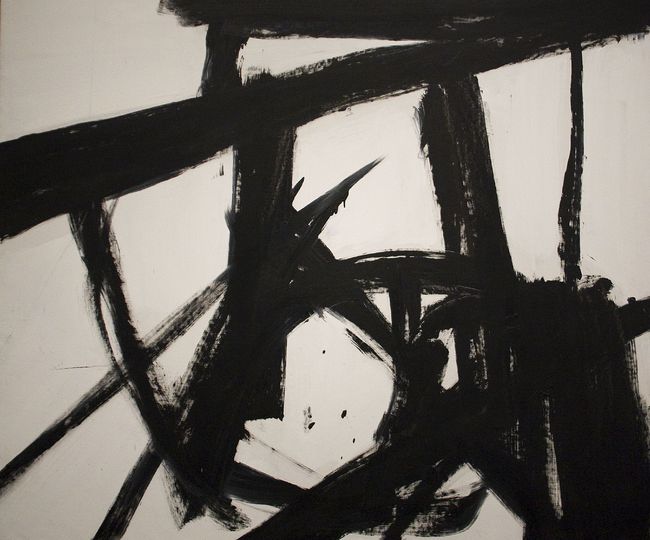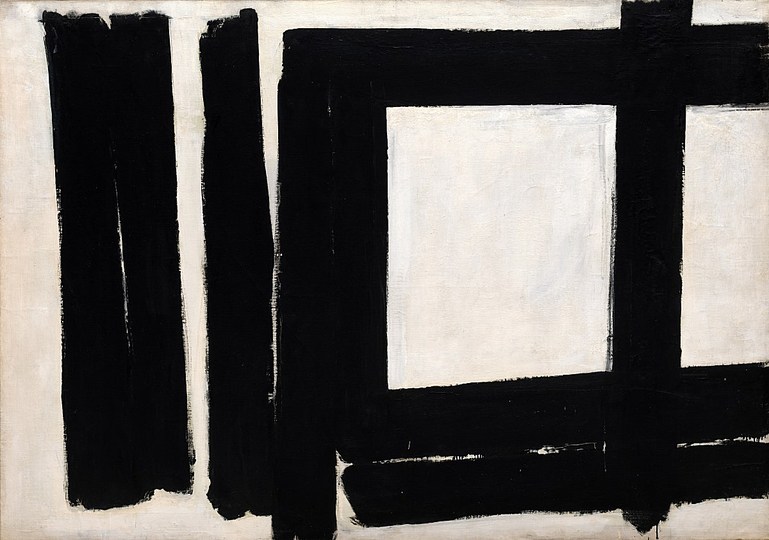Franz Kline
Born in the coal mining areas of Western Pennsylvania, his father died when he was a boy and he spent part of his childhood in boarding school. He traveled to England to study art in the late 1930s and acquired knowledge of European masters from Rembrandt to Manet. He returned to The United States and settled with his first wife Elizabeth Vincent Parsons in New York in 1938.
Some of his earliest drawings indicate a careful observation of Italian Renaissance draftsmanship, and some paintings explore the light of interiors in the mode of Vermeer. In the 1940s, he began to spend time regularly at the Cedar Bar where the artistic community met and he became a close friend of fellow artist de Kooning.
Around 1947, Kline shifted from realism to gestural compositions. In 1949-50 he developed to his signature style – large, iconic and minimal in black and white. His first solo show was at the Charles Egan Gallery in New York in 1950. He was amongst the founders of the Artists Club in 1949 and an initiator and organizer of the renowned Ninth Street Show (1951). By 1955, when his work was included in a group show at the Whitney Museum, he was acclaimed as one of the most important artists of Abstract Expressionism.
In the mid-1950s Kline reintroduced color into his black and white palette, initially in accents and embedded beneath black, then using increasingly broad segments. In the decade preceding his death just before his fifty-second birthday in 1962, his work was included in group exhibitions such as The New Decade: 35 American Painters and Sculptors at the Whitney Museum of American Art in New York (1955), 12 Americans at the Museum of Modern Art in New York (1956), and the traveling exhibition The New American Painting (1958), organized by the International Program of the Museum of Modern Art, and touring to Basel, Milan, Madrid, Berlin, Amsterdam, Brussels, Paris, and London.
Inspirations.
I See Violence in Your Eyes (I-VIII)
Pigment, graphite, charcoal, & mixed media on paper.
Who made this chair????
mystery chair...metal work reminds me of Robert Slezák. Limited chair production by Dupre-Perrin in...
Alessandro Mendini 1931-2019
For Alchimia, design is a cyle: everything that will have to happen has already happened, and the im...
VAW
In late 2018, we proposed a strategic repositioning of Vienna Art Week.
We suggested a fundamental...
Kunio Makaewa
Kunio Maekawa was a master of Japanese modernist architecture. He learned under Le Corbusier and was...
Pieter Bruegel
During his lifetime, Pieter Bruegel the Elder was already among the period’s most sought-after art...
Territorium: Ars - Techne-Krafts-Cosmovisión
Colección de imágenes que soportan investigación a nivel de postgrado: Maestría
Estudios Territ...
Writing & Design
Artists Abroad: A Woman´s Journey to Discover the Artists. Writer and Illustrator.
WRECK--Regeneration Experiment of Wasted Daily-use Ceramics from Chaozhou, China
WRECK, the destruction of decorum, the ruin of culture. BENTU went deep into daily-use ceramics indu...
The loft bar
Concept project of loft bar.
Stories of You
REVOIR is an interactive mirror, activated by emotion detection to create stories through visual lan...
One Hundred Thousand Games
One Hundred Thousand Games is an online game with unlimited levels. It takes the genre of first-per...
Art Driver
A obstacle driving computer game with visual art. Use the arrow keys on your keyboard to push obsta...
The Joys of Ice Skating
That skating 400 years ago was one of the most popular winter activities in the Netherlands can be s...
penccil: This was 2017
The penccil year in review is a project selection for 2017, this year curated by Mario Gagliardi. Se...
serpentine 2017
exhibition, schauspiel köln, cologne. steelobjects, ceramic reliefs.
BS1
temporary accessible sculpture.
We Ar
University of Sunderland MA Glass and Ceramics Show
UNTITLED PROJECT: CABIN [THOREAU]
UNTITLED PROJECT: CABIN [THOREAU] [ANGLET], 2016 –– a carved and painted replica of Henry David ...
Untitled Project: Honda CB77 Superhawk
UNTITLED PROJECT: HONDA CB77 SUPER HAWK, oil paint on carved wood, 2013-2014 –– A carved/painted...
Jeff Zimmerman
Jeff Zimmermann is a Chicago based artist. Born in Kentucky, Zimmerman spent his childhood among nat...
Kenzo Tange
Kenzo Tange was born September 4, 1913 in Osaka, Japan. After graduating from the University of Toky...
New Generation
Experiemntal art
American Food
Davide Luciano is a New York based conceptual food and beverage photographer and motion artist. His ...
What Is A Simulation?
What is a simulation?
It is a private game we devise when the aliveness of a situation is too comple...
The art of improvising art
The recently abandoned administrative headquarters of Austrian Post, an imposing turn of the century...
Memphis Posters
4 posters by the legendary Italian design collective Memphis Milano.
Just Before Paradise
“And just as we learn about our lives from others, so, too, do we let others shape our understandi...
Kippenberger
Martin Kippenberger (born 1953 in Dortmund, died 1997 in Vienna) is one of the foremost and simultan...
“I perhaps owe it to flowers that I became a painter.”
Arguably the most important painter of gardens in the history of art, Monet was also an avid horticu...
Expression/Information
Painting is seen as a form of practice that—contrary to canonical accounts—in no way shies away ...
Total Automation
In The Promise of Total Automation, artists examine technology in its complexity. They point out our...
German Art since 1960
German ‘paragons of painting’ such as Georg Baselitz, Jörg Immendorff and Markus Lüpertz have ...
Jean Lurçat
Jean Lurcat, painter, poet and ceramicist, great renovator of contemporary French tapestry, produced...
Scum Pixel
'Scum' refers to a foamy layer or mass that forms on the surface of liquid when it is boiled or ferm...
Carlo Scarpa: Sketch and Work
There is hardly another architect of the 20th century in whose work the progression from sketch to c...
Peter Zumthor: Thinking Architecture
A selection of remarkable work by Swiss architect Peter Zumthor.
The Bauhaus Revolution
The Bauhaus was the most influential design school of the 20th century.
See more in the new magazin...
In Infinity
Yayoi Kusama’s unique imagery spring from the recurring hallucinations that have haunted her since...
In Orbit
"When I look at these complex layers of translucent lines and spheres, I am reminded of models of th...
Sislej Xhafa
Sislej Xhafa has furnished the waiting room of a police station in Gent like a grand palace. He pres...
reversed silhouettes
.......
Heartbeat, Heartseat
Heartbeat consists of a massive heart glowing to the rhythm of a strong, deep and low frequency hear...
This City
This City is an audio-visual piece performed as musical alter-ego Mark Eats. It explores what happen...
Eric Giraudet de Boudemange
Eric Giraudet de Boudemange (1983) graduated in 2007 from the National School of Fine Arts in Paris ...
Christian Herdeg: Kunst und Bau
Christian Herdeg was born 1942 in Zurich. Trained as a photographer, cameraman and lighting technici...
Une Cité Industrielle by Tony Garnier
Tony Garnier designed the plans of an ideal city during his stay at the Villa Médicis from 1899 to ...
Obsolete Distinction
In contemporary society, the digital world pervades the physical to such an extent that any distinct...
“I’m not supposed to talk about it”
Nine artists were invited to exhibit in Pyongyang, the North Korean capital of the unknown. The enti...
The Glass House
"This house was Philip Johnson's autobiography—all of his interests were visible, and all of his a...
Francois Morellet 1926 - 2016
Since he first began making work in the 1950s, Morellet has been engaged in creating work which has ...
20th Century Italian Tables
A collection of 20th century Italian table designs.
Xavier Antin: Printing at Home
A printer manual to disturb and disrupt the printing process.
Xavier Antin, born in 1981, lives and ...
The Oily Actor
“I had been looking around these ideas of systemic crisis, global financial crisis, which is what ...
Julius Shulman: Visual Drama
"Julius had an eye for visual drama. With modernist buildings, he loved capturing the strong lines s...
Robert Slezak
A trained locksmith from Bystrice pod Hostýnem, then part of the Austro-Hungarian Empire, Robert Sl...
Jewelry Design Art
Jewelry Art design pattern inspired from nonlinear dynamics.
Drawings collection about fluid flows...
BASILE ARTECO "Falce/Scythe" design anonimo
Design Anonimo, Scythe in forged iron handmade in Italy in the occasion of the exhibition of the "FE...
BASILE ARTECO "Ferro/B" design Enzo Mari
DESIGN ENZO MARI: Forged iron fruit-bowl, Limited Edition of 6 numberd and signed by the Author Enzo...
Universality of the Vortex-Sphere Archetype
The Universality of the Vortex-Sphere Archetype - Code nature sign language
Following the entire pr...
Colliding Worlds
Architectural models of small planets appear in unexpected places. (C) Mario Gagliardi 2007
Jean-Jaques Lequeu
Jean-Jacques Lequeu (1757-1825) worked as a draughtsman at Rouen, and from 1779 in Paris at the Cad...
Jorge Zalszupin and L'Atelier
Jorge Zalszupin (b. 1922), a native of Warsaw, Poland, studied architecture at Bucharest's Ecole des...
Untitled Project: GOLD /eBAY
http://conradbakker.tumblr.com/post/142238609646/goldebay
Palmyra, End of March, 2016
Palmyra. City of Mesopotamia, city of the Phoenicians, of the Assyrians, the Greeks, the Persians, a...
Raymundo Colares
Raymundo Colares (1944 in Grão Mogol, Minas Gerais - 1986 in Montes Claros, Minas Gerais) was a Bra...
Jindrich Halabala, United Arts and Crafts
Jindrich Halabala (May 24, 1903 Korycany - November 18, 1978 Brno) was a Czech furniture designer, w...
Tamara
Tamara de Lempicka (1898 – 1980) was a Polish Art Deco painter. She was the most fashionable portr...
Royère
Jean Royère (1902-1981) worked in the import-export business before working for cabinetmaker Pierr...
Bring the outside in: The houses of Joseph Eichler
“Eichlers,” as they are referred to in California, are midcentury modern tract homes developed b...
also:
Field of Notion
Field of Notion delves into the dichotomies of light and shadows, life and death, creating a series ...
Paintings 2024
An ongoing series of mixed media paintings
Trompe l´oeil
Rugs "Trompe l´oeil".
Design: Mario Gagliardi for Mario and Casa.
gift: 礼物
gift, color on paper, by zhu yuzhou, 2022.
Eden
Paper sculpture
Choreography of pictorial fetishes
Afterword by WM Hunt
These are photographs.
These exist uniquely as photographs. The artist, Manuel ...
McDEAD ..and lovin' it!
In Australia we call McDonalds - Maccas.
Maccas holds a special place in my heart... it's called cho...
MILEY CYRUS is a ZOMBIE
This is an unused piece for the Australian comic ZOMBIE CITIES by Zorab del Rio.
I can understand to...
TOKYO ZOMBIES
This is the inks for TOKYO ZOMBIES,
a piece I did for the Australian comic called ZOMBIE CITIES by ...
SPACE GIRL
Comic Art, Illustration, Art, Line Art, Brush, Comics.
PAISAJES DE L'EMPORDÀ
Collage
CROMOS
Collage
SALTO
Sculpture
HISTORIA DE UN HUEVO
Sculpture
PERSONAJES
Collage
EL CAMINO MÁS LARGO
Sculpture
VEOVEO
Painting
ADELA
Sculpture
SÚBER
Sculpture
EL PAPEL DE LA FAMILIA
Ilustraciones para artículo: El Papel de la Familia (Hospital Sant Joan de Déu) 2023
VIENTO EN POPA
Mixed Technique
PINTAORA
Painting
EQUILIBRIOS
Escultura
Shop Them - DR NOKI T-shirts are here!
penccil is happy to announce its launching of penccil shop <t https://penccil.com/shop with fashion ...
Pianeti
Rug set "Pianeti", designed by Mario Gagliardi for Mario and Casa. Handcrafted in 100% New Zealand M...
curve wood
Title is affranchir la ligne, a public art commission for the lobby of a sports complex, plays with...
briller par son absence
burn wood
Surface N° 2
Arctic Paper presents Surface N° 2 – a second edition featuring a specially curated selection of ...
Coloured stones
The coloured stones is use Traditional Chinese Taihu Stone
Casa Sperimentale
One of the most visionary built experiments of 20th century architecture was created through the per...
colors
colors
The Demonstrations series.
A new series of paintings, oil on canvas, that deal with movement, the power and energy of the crowd...
Curtains
A series of watercolour paintings.
Laurel Hills Residence
A beautiful example of a contemporary Californian residence, designed by Assembledge architects. The...
Los Angeles
Traveling with Google Maps
Architectural sculptures
Architectural sculptures by K. Kegelmann as part of "Future City" curated by Mario Gagliardi at the ...
Pierre Bonnard: The Memory of Colors
In autumn and winter 2019/20 the Bank Austria Kunstforum Wien presented »Pierre Bonnard - The Color...
Francesco Vezzoli: Antique not Antique
Francesco Vezzoli at MUSEO MUSEION.
Surrealism
Inspired by Surrealism and some of the artists of that time (such as Dali or Ernst), I created basic...
Arte generativo
Ejemplos de arte generativo que sirvan de inspiración
Rudolf Belling
Rudolf Belling was sculptor, designer, architect and stage designer. In 1908, he founded a studio fo...
CoBrA Magazines
The avant-garde art collective CoBrA (Copenhagen, Brussels and Amsterdam) existed from 1949 to 1951....
Good design is finding a solution to a problem. Great design is finding the simplest solution to the same problem.
— Nicholas Petersen
— Nicholas Petersen
- penccil is free.
- No trackers. No cookies.
Just creativity.
